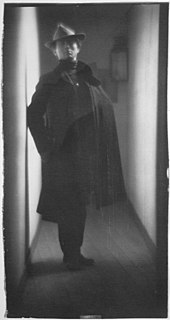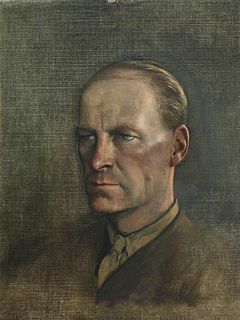A Quote by Edward Steichen
The precision of hisskill places his work beyond the tentative and the experimental stage. He is continually searching and exploring both himself and his surroundings. and in this exploration of the realm of places, people and things, contrasts and relationships, Callahan is no respecter of conventional technical formula or code. His delicate sense of pattern is an integral part of his photography and not a thing by itself.
Related Quotes
A child in his earliest years, when he is only two or a little more, is capable of tremendous achievements simply through his unconscious power of absorption, though he is himself still immobile. After the age of three he is able to acquire a great number of concepts through his own efforts in exploring his surroundings. In this period he lays hold of things through his own activity and assimilates them into his mind.
I cannot define for you what God is. I can only say that my work has proved empirically that the pattern of God exists in every man and that this pattern has at its disposal the greatest of all his energies for transformation and transfiguration of his natural being. Not only the meaning of his life but his renewal and his institutions depend on his conscious relationship with this pattern of his collective unconscious.
There is a myth, sometimes widespread, that a person need only do inner work...that a man is entirely responsible for his own problems; and that to cure himself, he need only change himself....The fact is, a person is so formed by his surroundings, that his state of harmony depends entirely on his harmony with his surroundings.
For who can wonder that man should feel a vague belief in tales of disembodied spirits wandering through those places which they once dearly affected, when he himself, scarcely less separated from his old world than they, is for ever lingering upon past emotions and bygone times, and hovering, the ghost of his former self, about the places and people that warmed his heart of old?
The goal of faithfulness is not that we will do work for God, but that He will be free to do His work through us. God calls us to His service and places tremendous responsibilitie s on us. He expects no complaining on our part and offers no explanation on His part. God wants to use us as He used His own Son.
[Man] is the only animal who lives outside of himself, whose drive is in external things—property, houses, money, concepts of power. He lives in his cities and his factories, in his business and job and art. But having projected himself into these external complexities, he is them. His house, his automobile are a part of him and a large part of him. This is beautifully demonstrated by a thing doctors know—that when a man loses his possessions a very common result is sexual impotence.
The scientist does not defy the universe. He accepts it. It is his dish to savor, his realm to explore; it is his adventure and never-ending delight. It is complaisant and elusive but never dull. It is wonderful both in the small and in the large. In short, its exploration is the highest occupation for a gentleman.
The master in the art of living makes little distinction between his work and his play, his labor and his leisure, his mind and his body, his information and his recreation, his love and his religion. He hardly knows which is which. He simply pursues his vision of excellence at whatever he does, leaving others to decide whether he is working or playing. To him he's always doing both.
The fact that labour is external to the worker, i.e., it does not belong to his intrinsic nature; that in his work, therefore he does not affirm himself but denies himself, does not feel content but unhappy, does not develop freely his physical and mental energy but mortifies his body and his mind. The worker therefore only feels himself outside his work, and in his work feels outside himself.
Photography is a medium of formidable contradictions. It is both ridiculously easy and almost impossibly difficult. It is easy because its technical rudiments can readily be mastered by anyonwith a few simple instructions. It is difficult because, while while the artist working in any other medium begins with a blank surface and gradually brings his conception into being, the photographer is the only imagemaker who begins with the picture completed. His emotions, his knowledge, and his native talent are brought into focus and fixed beyond recall the moment the shutter of his camera has closed.
God has sovereignly pulled back the curtain on His glory. He has disclosed Himself on the platform of both creation and redemption that we might stand awestruck in His presence, beholding the sweet symmetry of His attributes, pondering the unfathomable depths of His greatness, baffled by the wisdom of His deeds and the limitless extent of His goodness. This is His beauty.
What a wee little part of a person's life are his acts and his words! His real life is led in his head, and is known to none but himself. All day long, the mill of his brain is grinding, and his thoughts, not those of other things, are his history. These are his life, and they are not written. Everyday would make a whole book of 80,000 words -- 365 books a year. Biographies are but the clothes and buttons of the man -- the biography of the man himself cannot be written.



































